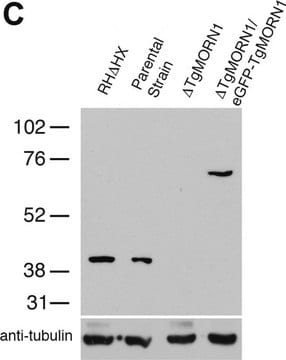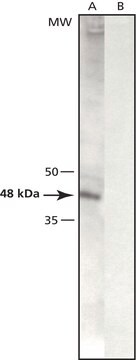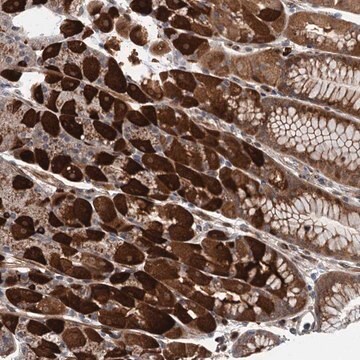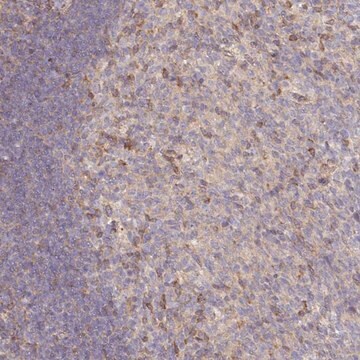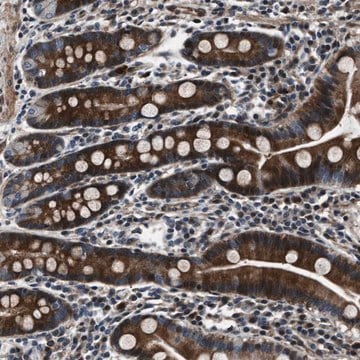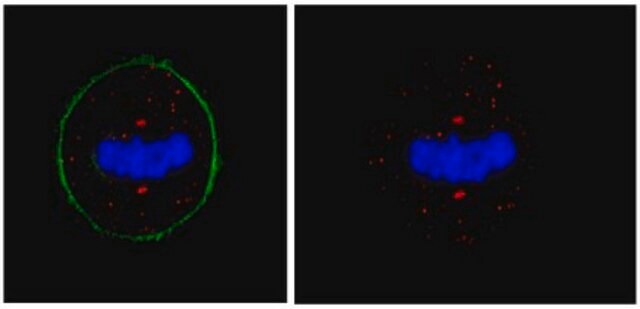T6557
Anti-γ-Tubulin antibody, Mouse monoclonal
clone GTU-88, ascites fluid
Synonyme(s) :
Anti-γ-Tubulin antibody, Mouse monoclonal
About This Item
Produits recommandés
Source biologique
mouse
Niveau de qualité
Conjugué
unconjugated
Forme d'anticorps
ascites fluid
Type de produit anticorps
primary antibodies
Clone
GTU-88, monoclonal
Poids mol.
antigen 48 kDa
Contient
15 mM sodium azide
Espèces réactives
rat, hamster, chicken, human, bovine, canine, Xenopus, mouse
Technique(s)
immunocytochemistry: 1:5,000-1:10,000 using HeLa cells
indirect ELISA: suitable
western blot: 1:10,000 using cultured chicken fibroblast extract
Isotype
IgG1
Numéro d'accès UniProt
Application(s)
research pathology
Conditions d'expédition
dry ice
Température de stockage
−20°C
Modification post-traductionnelle de la cible
unmodified
Informations sur le gène
human ... TUBG1(7283)
mouse ... Tubg1(103733)
rat ... Tubg1(252921)
Vous recherchez des produits similaires ? Visite Guide de comparaison des produits
Description générale
Monoclonal Anti-γ-Tubulin (mouse IgG1 isotype) is derived from the GTU-88 hybridoma produced by the fusion of mouse myeloma cells and splenocytes from an immunized mouse.
Spécificité
Immunogène
Application
Monoclonal Anti-γ-Tubulin is also suitable for use in immunochemical applications such as immunoblotting, immunocytochemical staining of cultured cells and in ELISA.
Actions biochimiques/physiologiques
Forme physique
Stockage et stabilité
Clause de non-responsabilité
Vous ne trouvez pas le bon produit ?
Essayez notre Outil de sélection de produits.
Code de la classe de stockage
10 - Combustible liquids
Classe de danger pour l'eau (WGK)
WGK 3
Point d'éclair (°F)
Not applicable
Point d'éclair (°C)
Not applicable
Certificats d'analyse (COA)
Recherchez un Certificats d'analyse (COA) en saisissant le numéro de lot du produit. Les numéros de lot figurent sur l'étiquette du produit après les mots "Lot" ou "Batch".
Déjà en possession de ce produit ?
Retrouvez la documentation relative aux produits que vous avez récemment achetés dans la Bibliothèque de documents.
Les clients ont également consulté
Articles
Microtubules of the eukaryotic cytoskeleton are composed of a heterodimer of α- and β-tubulin. In addition to α-and β-tubulin, several other tubulins have been identified, bringing the number of distinct tubulin classes to seven.
Notre équipe de scientifiques dispose d'une expérience dans tous les secteurs de la recherche, notamment en sciences de la vie, science des matériaux, synthèse chimique, chromatographie, analyse et dans de nombreux autres domaines..
Contacter notre Service technique







